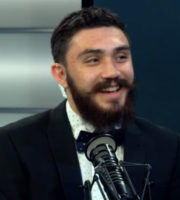
Refused to let her bring a translator
The University of California-Berkeley is facing a Title IX due-process lawsuit from an unusual plaintiff: a female foreign national facing deportation.
The student is seeking to reverse a two-year suspension she received after two ex-boyfriends accused her of sexual assault.
“Jane Doe” has an April 1 deadline to renew her H-1B visa, for which she needs a diploma. She has already completed all of the coursework to graduate, and the “sole effect” of her suspension is to “delay receipt of [her] diploma” until May 22, 2020, according to the suit.
She’s asking the Alameda County Superior Court to force the university to lift her sanction and halt her suspension so she can receive her diploma and remain in the U.S. while the lawsuit continues. This “immediate interim relief” is not “against the public interest,” the relevant legal standard.
Doe claims the university’s investigation was “marred by demonstrable bias” against her: It opened a second investigation without anyone filing a complaint. UC-Berkeley also imposed “undue burdens” that included blocking her translator and not taking into account her health issues.
Doe’s lawsuit takes issue with several procedural decisions the school made, including delaying the investigation despite her need to renew her visa. UC-Berkeley also used a “single investigator” model in which one figure acts as investigator, prosecutor and tribunal.
That investigation model was banned across California under an appeals court ruling against the University of Southern California in January. The court also said a “live hearing where parties may cross-examine each other” is necessary for a fair trial.
MORE: USC ignored likelihood female invented rape to not get fired
An executive member of the Associated Students of the University of California told The College Fix the administration was implementing the ruling.
Suzanne Taylor, Title IX coordinator for the UC system, “has done a fantastic job of keeping students looped in as changes are made following the USC lawsuit,” Nuha Khalfay, ASUC external affairs vice president, wrote in an email.
Khalfay also noted that she and Taylor “are constantly in conversation with [the] UC administration to ensure cooperation on this issue.”
Doe’s lawsuit contends that these new practices should have been applied to her original university hearing, and not instead used to delay her requests for appeal.
Khalfay earlier told The Daily Californian, regarding the Jane Doe case: “It takes a lot for someone to be found guilty through the university process, and I will always believe survivors.”
Opened second investigation without a complainant
Doe received her suspension following two investigations into her former relationships, which took more than 18 months to complete, according to the suit.
She dated “James Coe” starting December 2016 before the two broke up the following February. She then dated “John Roe” toward the end of the 2016-17 school year. Both were classmates. She had sex with Roe but their “relationship began to suffer” in May after Doe learned he was “seeing other women.”
The next month, Doe stayed the night at Roe’s apartment because she had forgotten the key to her own residence. The suit claims the two had an argument, then Doe slept on Roe’s couch and left in the morning, officially ending their relationship.
Roe initially claimed that Doe had visited his apartment uninvited, slept on his couch without permission, and was “knocking on his door throughout the night.” Later he admitted that he had actually invited Doe to stay the night, according to the suit.
Roe filed a complaint against Doe on July 25, accusing her of sexually assaulting him in April. He asked Coe – Doe’s previous boyfriend – to be one of his witnesses during the investigation. The university opened another investigation against Doe after Coe testified, even though Coe “did not request such an investigation,” which showed it was biased against her.
Doe received an interim suspension in August that allowed her to continue classes but limited her access to school-related activities.
MORE: Suzanne Taylor dares judges to force UC to follow the law
The principal Title IX investigator for the Office of the President “failed to follow up with certain investigative leads” and “declined to ask many of the investigative questions” that Doe submitted, the suit claims. Chris Carrubba-Katz also imposed “arbitrary restrictions” on Doe’s ability to review collected evidence.
Carrubba-Katz released the reports on Feb. 27, 2018, without holding an evidentiary hearing. The investigator found Doe committed “sexual harassment, stalking and violation of a no contact directive” against Roe, and violated a non-sexual harassment code. For Coe, Carrubba-Katz said Doe committed sexual harassment, stalking and dating violence, and recommended that the Center for Student Conduct consider whether Doe also violated weapons and stalking provisions.
Doe requested a meeting with the center’s Ben Fils to “lodge her objections” with Carrubba-Katz’s reports, but requested extensions due to midterms, a “death in the family” and “acute health issues” that resulted in hospitalization.
Though Doe had only begun speaking English a year and a half before coming to the United States, the university refused to let her chosen translator accompany her to the meeting with Fils, according to the suit.
The university’s objection was that the translator was “also an attorney,” but it was not relying on “any written policy” to ban the translator on those grounds. Doe instead had to rely on a friend “proficient” in her language to translate for her.
(The copy of the lawsuit made available to The Fix redacts any mention of ethnicity, language, or country of origin in regard to Doe or her accusers.)
Female foreign national sues UC-Berkeley for due process violations in Title IX case by The College Fix on Scribd
MORE: Appeals court blasts USC for indifference to exculpatory evidence
Her meeting with Fils, a week after her release from the hospital, led to a finding for which she had never been charged. The case manager and conduct coordinator not only upheld Carrubba-Katz’s findings but found Doe guilty of “violating a no-contact directive” in July.
Doe is not the only student to publicly question the methods of Carrubba-Katz, who remains principal Title IX investigator.
Last fall, UC-Santa Barbara’s graduate student representative on the systemwide Title IX Student Advisory Board accused Carrabba-Katz of trying to water down a student-designed survey of student experiences in the Title IX system.
Carrubba-Katz wanted survey designers to “put a positive spin” on the results and “emphasize the strengths of the investigative process,” Jennifer Selvidge wrote in her resignation letter, obtained by The Daily Nexus. The Title IX investigator also allegedly warned against allowing anonymous responses because it would create “overly negative” results.
Selvidge called on both Carrubba-Katz and Taylor, the systemwide Title IX coordinator, to resign their positions “for their lack of respect for academic scholarship.”
One finding overturned, but same sanctions inexplicably upheld
Doe appealed both cases in May 2018 but the university flagrantly violated its promises to complete appeals within 60 days and the entire investigative process within 120 days, according to Doe.
The investigations were “marred by procedural errors” that affected the outcome, Fils’ decision was “unreasonable based on the evidence,” the investigator was “unaware of new, mitigating evidence,” and the sanctions were “disproportionate to the findings,” Doe said in her appeal.
Hearing officer Barbara Dalton rejected most of her arguments “from the outset,” instead permitting “limited arguments” on some procedural and unreasonableness issues and “a single piece of new mitigating evidence.”
Dalton held hearings on Nov. 28 and Dec. 7, the first for Coe and second for Roe. Her decisions on Jan. 28 came “192 business days (and 281 calendar days) after Fils issued his Case Outcome Letters,” according to Doe.
MORE: UCSB hid accuser’s hallucinatory prescription from accused
The hearing officer upheld Fils’ findings in the Roe case but reversed him in the Coe case, finding that Doe had not sexually harassed him. Inexplicably, Dalton upheld the full sanctions against Doe.
On Feb. 1 she appealed the Coe decision – the only one she could – in order to overturn the sanctions, but the university again violated its promised time window of 10 days. Assistant Vice Chancellor Anne Jones told Doe on Feb. 15 that “[d]ue to recent changes in case law, the review of your appeal will take additional time.”
Jones also told Doe that the university would render a decision on March 30, just two days before Doe’s deadline to apply for her visa. Not even this was set in stone.
Four days later, the university informed Doe that it was pausing her appeal due to “recent legal developments,” the most recent of which was six weeks earlier. Until the revisions to its Sexual Violence and Sexual Harassment Student Adjudication Framework are complete, the chancellor won’t consider her appeal.
‘Extreme delays’ violate contractual obligations to student
Doe’s suit cites these “extreme delays in conducting the disciplinary process” as violations of the university’s contract with her, with dire effects for her life in America.
If she doesn’t submit her visa renewal, Doe will be “forced to leave the country,” which will cause her to lose her job and “ability to support herself and her family.” She’ll also lose her access to healthcare which she requires for her health condition. (The suit doesn’t specify whether the university provides her healthcare.)
Doe’s other legal claims are similar to those in typical due-process lawsuits over Title IX proceedings.
The university provided neither “an in-person evidentiary hearing” nor a process for Doe to “cross-examine diverse witnesses” before a neutral fact-finder. It failed to give “adequate notice of the allegations against Doe,” also in violation of its policies.
Its findings were “materially incomplete” because of its failure to “follow up with certain witnesses or on certain theories,” and due to its “omission of highly relevant testimony that contained exculpatory evidence,” Doe argued.
The suit’s allegation that the university “undercut her ability to defend herself by unduly and arbitrarily restricting the manner [in which] she translated proceedings” is similar to suits that allege universities failed to provide reasonable accommodations to students with special needs.
An accused student with a learning disability and “word retrieval” problems accused Drake University of failing to accommodate his needs in violation of Americans with Disabilities Act. Though the university is facing trial in that case, the ADA claim was thrown out.
MORE: Drake University faces trial for expelling male victim of female student
IMAGE: Tashatuvango/Shutterstock
Like The College Fix on Facebook / Follow us on Twitter






Please join the conversation about our stories on Facebook, Twitter, Instagram, Reddit, MeWe, Rumble, Gab, Minds and Gettr.